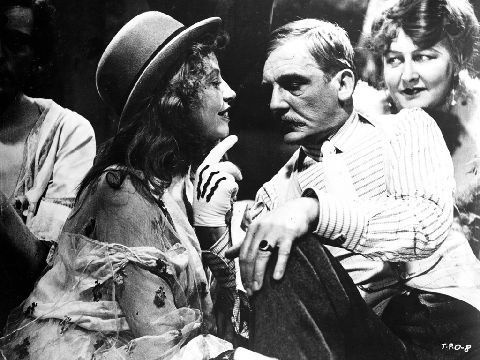The Threepenny Opera (1931) 

Director: G. W. Pabst
Cast: Rudolf Forster, Lotte Lenya, Carola Neher
Synopsis: In London at the turn of the century, the bandit Mack the Knife marries Polly without the knowledge of her father, Peachum, the ‘king of the beggars’.
Penned more by Elisabeth Hauptmann than Bertolt Brecht, the commonly acknowledged writer of The Threepenny Opera, it was Brecht’s infidelity towards Hauptmann with actress Carola Neher (who stars in this film as Polly and would die eleven years later in a Russian prison camp) that formed part of the inspiration for Hauptmann’s spin on John Gay’s operetta. The Threepenny Opera is one of those titles that many people have heard of but which few know — apart, perhaps, peripherally via the Bobby Darin version of Mack the Knife, which is the Opera’s signature tune. This is probably the best of the three movie versions, but is rarely screened and deserving of a larger audience for its historical importance if nothing else.
The tale revolves around Mackie Messer (Rudolf Forster), king of the London underworld, who, on a whim, marries Polly Peachum (Carola Neher) daughter of the King of the Beggars (Fritz Rasp), whose wrath is invoked by such an underhand deed. Peachum blackmails Tiger Brown, the Chief of Police (Reinhold Schunzel), and a conspiratorial friend of Mackie’s, into having him arrested and thrown into prison, and Mackie’s new wife immediately plots to free him…
Legendary director G. W. Pabst’s version of The Threepenny Opera has some outstanding moments but isn’t a classic by any means. By making no attempt to adapt the stage play into a more suitable format for the cinema he fails to engage the viewer in the story or to develop any degree of narrative drive in the plot. The direction itself, however, is terrific, with superlative camera work. The lens is constantly on the move, as if it were a silent character in the story, roaming the thieves den or the Chief of Police’s office, and moving in close to catch all the intimations of a pivotal conversation before pulling away to go and look at something else. This device draws the viewer into the story more than the narrative ever tries to do and creates a nice sense of atmosphere, which is important because, while the set design conjures up a nicely seedy, back-street-drinking-hole atmosphere, we never for one moment feel as if we are in an actual London back street drinking hole. Of course, this is largely because the characters all speak German while throwing around a cornucopia of the city’s locations in their conversations. Even Mackie’s Wanted poster is written in German.
The pace of the story is very slow, again a consequence of its stage origins, where storyline isn’t necessarily the most important aspect of a piece of work like this, but the effective set design and direction from Pabst will offer plenty of distractions for the active viewer. The acting is also pretty good, especially from a young Lotte Lenya as Pirate Sally, the ultimate woman scorned, and Rudolf Forster in the difficult role of Mackie. We are left in no doubt that Mackie is a thief, a womaniser and a seducer of under-age girls, and yet, while maintaining a swaggering, self-confident poise throughout, Forster manages to at least make Mackie a reasonably likable character if not exactly a lovable one.
(Reviewed 26th August 2005)
httpv://www.youtube.com/watch?v=mpkejsMOmWk
